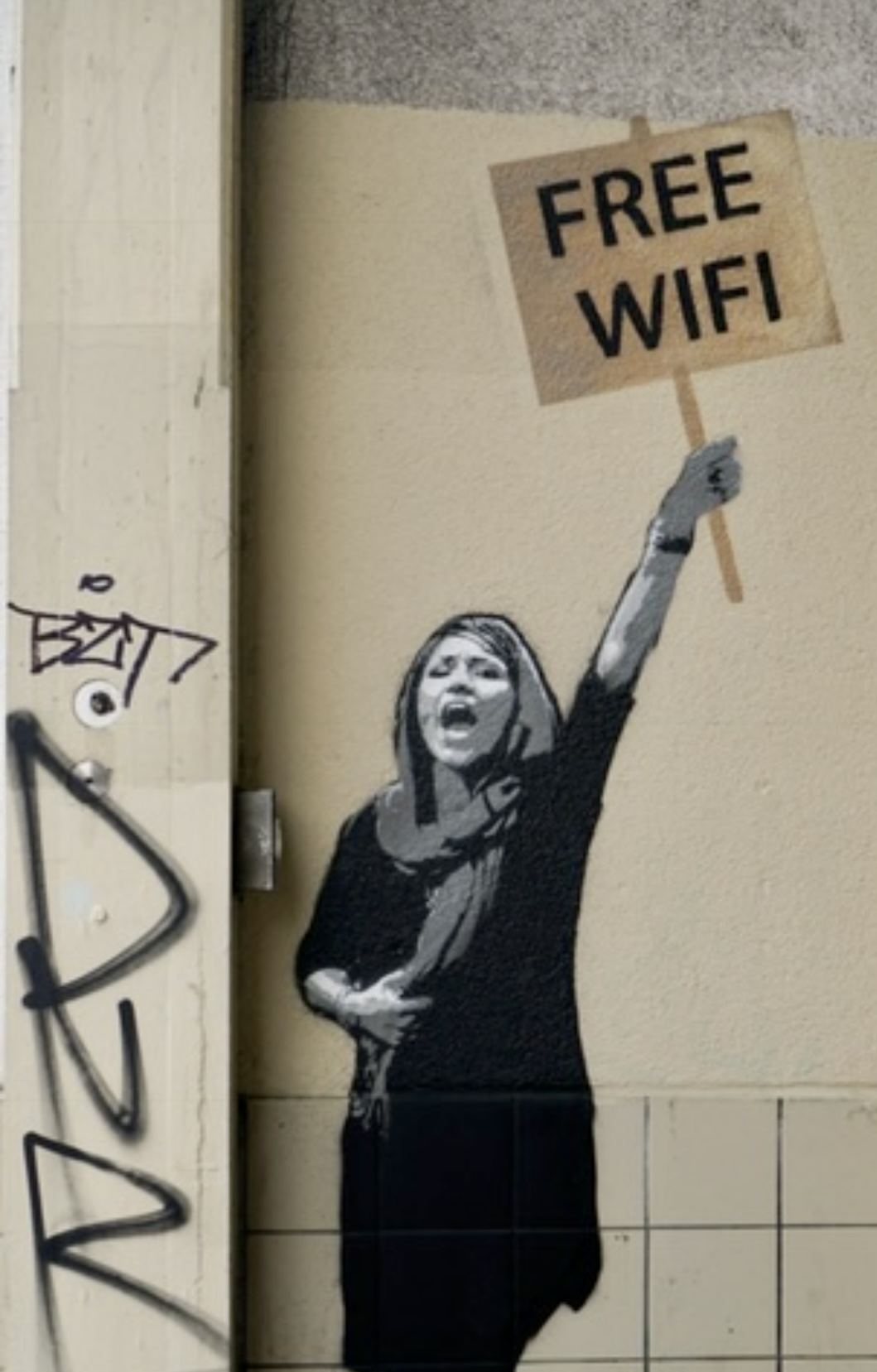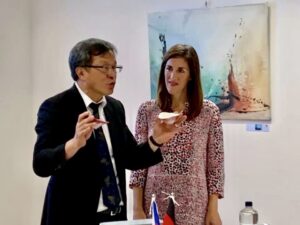Week 1 Reflection – The Point of All This

How did I end up on the wrong train?

U-Bahn in Berlin
My journey to EFI was nothing I could have imagined but the fact that I’m here echoes the intentions I had as an idealistic freshman studying sociology and psychology 31 years ago. At graduation, I had no applicable skills (or vision) to forge an intentional future, so found myself falling backwards into a variety of unexpected careers and situations – landing on an aircraft carrier in the Pacific to conduct attention research, setting performance standards for fast-food drive-thru wait times, and analyzing the speed, cost and success of lawsuits against debtors. It’s easy to capture a 25-year war/fast-food/debt-collection path succinctly in hindsight and it’s certainly not a bill I could have sold my 22-year old self. I wasn’t completely blind to or at peace with my role in society in those years but life had momentum and I wasn’t sure how or when to step off the train.
How did I switch tracks?

Street art near Hallesches Tor U-Bahn stop
Six years ago I met a woman who had moved back to the US after 2 years in Europe. In meeting her it became clear to me that it would be a welcome disruption. My husband was game, so 8 months later we unpacked our suitcases in Berlin, finding ourselves around the corner from President Steinmeier and sandwiched between diplomats and embassies or “residences” in the case of (heartbreakingly) unrecognized nations. This was a different world from our block parties in Seattle.

Shieh Jhy-wey, Taipei Representative in Germany
For 5 years, I was immersed in unfamiliar cultures and languages through volunteer work, social connections, and travel. Without existing affiliations or commitments, it was my 100% occupation to observe and decipher my surrounds, and I tackled this through what might be considered extreme enthusiasm. I volunteered daily at my daughter’s school, joined multiple social and philanthropic groups, attended endless cultural events, took daily language classes, accepted all coffee invitations, and suffered regular chastisement from strangers (a popular activity amongst Berliners) – from which I learned I didn’t need to understand language to understand disapproval or distain. In general, I found myself alternately welcomed and unwelcomed daily.

Afghan refugee entering through Frankfurt airport for resettlement in Berlin, Germany.
My involvement with an NGO working in Afghanistan took root and I ultimately found myself helping to extract women and children in 2021 and even personally resettle a small group to Berlin. The experience was frustrating, heartbreaking, hopeful, rewarding and angering. I ended on ‘How are we at the point where an American woman is handling the wellbeing and future of a 12-year-old autistic Afghan girl in Berlin, Germany?’ and ‘How will these outsiders ever become insiders if I (with two upper hands) had not scratched the surface in five years?’
Why EFI?
In my years as an outsider, I became acutely aware of the role membership (or lack of) in various communities impacted my and others’ mental health, opportunities, and contribution – and the effect that active vs. passive inclusion had on the diversity and engagement of community membership. I sought out EFI because I plan to focus the remainder of my working years on building community through active social inclusion and engagement. My hope is that this program will supplement my motivation with the knowledge and skills to competently make differences at the infrastructural level of society.
Und? (And…?)

From the land of pen, paper (1986). Wow, so much to unpack.
Five days in, I can see that the scope of the program content goes beyond what I knew I needed to learn. Score! One unexpected and poignant learning (perhaps not even intended by the program) has been the status of my own digital literacy. Which is shockingly low. Shock-ing-ly. I have spent countless wandering and frustrating hours over the past two weeks trying and failing to orient myself within and across what feels like about a dozen unfamiliar, redundant, and unnecessarily complex platforms and modes of content storage, communication and content production. The disorientation has led to self-doubt (is it too late for me to learn how to work in the digital space?), feelings of isolation, lower than desired engagement during live sessions, and wasted time (e.g., reading the same messages on multiple platforms or not being able to find information I’d seen prior). Obviously no fun, BUT oddly valuable. I’ll explain.

Street art near Buelowstrasse, Berlin, Germany.
One of the articles I read for my Exclusion and Inequality course illustrated my own experience of EFI in a concrete way. The authors examine digital exclusion (where access/ability to use digital technology inhibits participation) in the context of governments digitizing social services. In one case, already disadvantaged recipients of a service were excluded, or worse, penalized as a direct result of the digitization. The authors conclude that digital inclusion requires inclusive practices in system design and implementation, as well as resolution of access, affordability and digital literacy for all users. As I was reading, I considered the effect of my own digital literacy (or illiteracy) on my participation and independence in EFI and other aspects of my life. This one article paired with my experience in a new digital environment will influence my approach to future program assessments and interventions. My experience in the all-digital environment has also enhanced by understanding of other readings in Coloniality and Inequality and Exclusion courses, e.g.,
- The division of burden (cost, time, etc.) between those in power and subjects – how capitalism and economics pushes burden to subjects
- Who gains and loses opportunities and outcomes in the design of a program/tool/intervention, specifically as a function of complexity (intended as features)
Back to community
I know I will gain knowledge and skills that will help me work toward equity and inclusiveness in formal infrastructure in my future efforts, but I am seasoned enough to know these will be slow-moving and (at best) imperfect endeavors. So as I read and discuss this term, I will also be thinking about the role of community/social networks in bridging opportunity and outcome gaps for disadvantaged individuals. My personal experience being that we are most likely to help those that we know (or know of), value and are moved by.




Wow, Janel, I really identify with your struggles on so, so many levels. These ruminations this time around struck me: “‘How are we at the point where an American woman is handling the wellbeing and future of a 12-year-old autistic Afghan girl in Berlin, Germany?’ and ‘How will these outsiders ever become insiders if I (with two upper hands) had not scratched the surface in five years?’”
Last year, when I was writing to charities and refugee agencies to find out what could be done with this family I was trying to connect to help, I was shocked at how helpless people working at even the largest and best connected of the organizations seemed to be. Unless you managed to build a network of supporters willing to advocate on your behalf, I couldn’t figure out how a refugee was actually supposed to obtain help. And then what else didn’t help matters was that frequently there was this expectation that if they could just escape to countries like Germany that people would be fine. But this wasn’t the case at all.
Some years ago when I was living in Austria, during the height of the Syrian conflict that pushed a lot of people out, the rural province where I was decided to take in Syrians, but man, the discussion of what to do with them after taking them in was horrific. For the first year, these families were placed in a converted warehouse where the lights remained on 24 hours a day, and there really didn’t seem like there was a cohesive plan for moving them into a more permanent situation. This was an area that was still struggling with its decision to let Turkish migrants come in to work in jobs no one else wanted decades before. When those migrants then proceeded to try to stay and build a life, a significant percentage of the local population was less than. Passing A2 on a German test (an Austrian requirement for a long-term residence permit assuming one meets other criteria) is not going to integrate you enough to erase those tensions.
But honestly, given what you dealt with, I think you’ll get the digital stuff figured out. It’s just more systems built by people.
Theresa, I assume you recognize this, but perhaps I shouldn’t. I recognize you as a natural community builder and I appreciate the priority to put on ensuring others (and you) are in touch and have a support system even within the little sphere of this program.
Wow to this blog. Both your empathy and frustration are really coming through.
I am interested to connect more with you on the topic of colonialism, it’s something I have been focused on more recently. Looking forward to our Intensive week next week to discuss Built Infrastructure.
The format and structure of your blog has inspired me to explore options for my next blog. Happy to help you out with Teams if you ever need tips – I have been using it for work for about two years, I am no expert but have learned a few things along the way.
Darcie, thank you for your offer re: Teams. I will accept it as genuine! =)